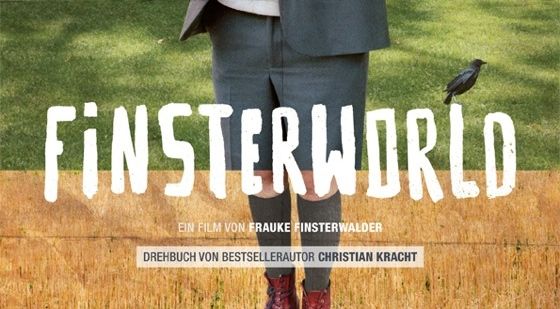 |
| Frauke Finsterwalder's Finsterworld co-written with Christian Kracht celebrates words of lore as well as colloquial rhythms and structures of non-communication. |
In part 2 of my conversation with director Frauke Finsterwalder and co-sreenwriter Christian Kracht on Finsterworld, we go beyond Slavoj Žižek's The Pervert's Guide To Ideology, Klaus Theweleit's Male Fantasies, Berlin architecture, Joseph Beuys, Kubrick's The Shining, Adorno, the beauty of Margit Carstensen and the legacy of "Gesichtswurst".
Anne-Katrin Titze: Let's talk about Margit Carstensen. Did you take her work with Rainer Werner Fassbinder into account when casting her?
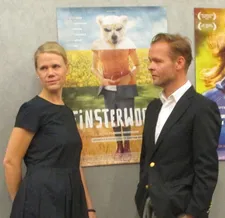 |
| Frauke Finsterwalder and Christian Kracht on the legacy of Gesichtswurst: "Also, the image of that sandwich, that's a mutual obsession." Photo: Anne-Katrin Titze |
Frauke Finsterwalder: I was thinking of Fassbinder's TV movie Martha (1974). That's the one where she gets abused by Karlheinz Böhm. It wasn't released until much later. They have this abusive relationship and finally she escapes from him and crashes her car. After that experience she will depend on him forever. Somehow the image of the beautiful Margit Carstensen [as Martha] in the wheelchair, that stuck to me. When I called Michael Maertens [who plays Claude, her closest alliance] and asked what he thought about Margit Carstensen [as Maria Sandberg], he screamed with happiness, "yes, please, I love her." There was for the two of them a physical attraction.
AKT: She looks beautiful in the film.
FF: I think she looks really beautiful. We had a hard time convincing her to put on these clothes, the makeup, to do her hair that way. She's so used to looking totally different.
Christian Kracht: She thought she looked too bourgeois. Remember that?
FF: She was insecure about her looks which fit the character very well. It was good for this role because she has this younger man who she is in love with.
AKT: Slavoj Žižek in one of his books makes a comparison between the different types of toilets and how they connect to the national character.
FF: He talked about it. That's how I actually started thinking about it. Being German, I grew up like that [with a kind of plateau in the bowl]. When you live in other countries and go back, it's freaky. They're changing the toilets now. Maybe the younger generation seems not so interested anymore...
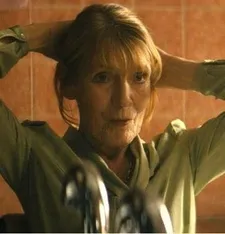 |
| Margit Carstensen as Maria Sandberg: "I think she looks really beautiful." |
CK: … in what they produced.
AKT: A second time, I thought of Žižek was in the concentration camp context. He said that what's missing in Hannah Arendt's discourse on the banality of evil was the enjoyment of being the perpetrator. I saw that enjoyment in the character of Maximilian.
CK: Certainly Maximilian (Jakub Gierszal) enjoys what he is doing. He is almost like a zombie or vampire feeding off the evil energy.
FF: I don't think so. We discussed this a lot. With the actor also. For me there's another layer to it.
CK: At the end when he is sort of "entschuldigt" ["excused" - literally "relieved of guilt"] because he was never hugged by his mother. That's kind of a little bit false.
FF: You think that. I don't. That's the scene when the audience can decide if they believe him at that moment, or not.
CK: I just think, technically, as a denouement of the script of the character, I don't see it in his psychology.
FF: The psychology of being evil is also a childish thing. You cannot say that about the history or what happened in Germany. Destroying is something children do. For me, Maximilian is much more that.
CK: That's the documentary filmmaker in you speaking. We taught our daughter not to catch flies and dismember them because it's evil.
 |
| Corinna Harfouch as Inga with Bernhard Schütz as Georg, crouching like a beige tiger who makes the sealed-off Cadillac interior entirely her own. |
FF: It's like Lord Of The Flies. Put children on an island with no rules and see what happens. We were talking about enjoyment. I think in evil there is also a childish enjoyment.
AKT: Dominik then would be a boy who is more civilised. He is talking to the bug instead of dismembering it. He also talks to his finger, in a Kubrick Shining moment, through the toilet paper. And he draws a face on his sandwich before eating it. This is the other side of childishness that is not violent.
FF: They have both sides. That's the fascinating thing with children. We as adults are trying to repress one or the other.
CK: Also, the image of that sandwich, that's a mutual obsession. I don't know if you are still familiar with "Gesichtswurst"? When Frauke was small, when you used to go to the butchers - and this happened to me in Switzerland too - to wean the kids on meat, they would dangle a piece and say: "this one is for you, little one." To get the taste buds accustomed to the killing of animals.
AKT: I absolutely remember those gifts at the butchers. Are you a vegetarian?
CK: No, but I'd like to be.
FF: We don't eat a lot of meat.
AKT: It's great. I can highly recommend being a vegetarian.
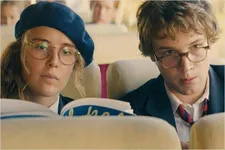 |
| Carla Juri as Natalie and Leonard Scheicher as Dominik: "It's like Lord Of The Flies. Put children on an island with no rules and see what happens" |
CK: Our daughter wants to be one. She is four.
AKT: But please go on with Gesichtswurst.
CK: I just wanted to say for the readers of this piece who may not be familiar - it's sort of a large German Mortadella-type of sausage that has a smiley face made out of different bits of meat engraved in it.
FF: They also have it with dinosaurs.
CK: The face is more insipid and evil.
FF: It's something I always wanted to have in a film.
AKT: I also used to get Gelbwurst [yellow sausage, very pale] when going to the butchers with my grandmother. That was the kind without a face.
CK: Yes, I remember Gelbwurst.
FF: I do too.
CK: But the fact that it's called "Face Sausage" - that ties in very well with the Holocaust. Really. The image [in Finsterworld] while the teacher [Christian Bach] is talking about this is very flippant, very frivolous. But it's actually not. It's very Germanic. Adorno said Auschwitz fängt im Schlachthof an [Auschwitz begins in the slaughterhouse]. And it's true. This is actually a very precise item of evil. He [Dominik] is putting Smarties on it to make it happy, but it's still something that is…
FF: Perverted.
CK: Perverted, yes.
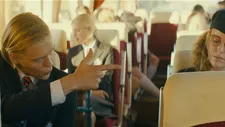 |
| Jakub Gierszal as Maximilian taking aim at Natalie: "The psychology of being evil is also a childish thing." |
AKT: There is a short scene with Dieter Meier [from Yello] who plays a furrier as a kind of oracle. The scene is a bit of an enigma. My partner, Ed Bahlman, recognised the name because he knew him. I only wondered about his strange and only line that "a smile is the small change of happiness."
CK: We were actually friends with him in Argentina. He has a ranch there and he invited us to come and write the screenplay on his ranch.
FF: Actually some of the best scenes were written there.
CK: We thought we'd like to have him in the film as a thank you. And that line is from [German actor] Heinz Rühmann.
FF: He is very oracle-like.
CK: He is sitting there spider-like.
FF: He is one of the few extras that we have [Meier as the furrier].
AKT: Did you think of video artist Nayland Blake [Starting Over has Blake tap dancing in a bunny costume weighing 146 pounds] at all when choosing the main furry costume [worn by Tom - Ronald Zehrfeld]?
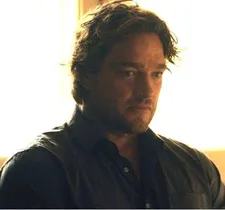 |
| On Ronald Zehrfeld as Tom, a furry: "But one could talk about Beuys at that point. The fur. The earth in the forest." |
FF: No. But one could talk about Beuys at that point. The fur. The earth in the forest.
AKT: A scene I want to ask you about is the entry of the school class to the concentration camp, encountering an other class leaving, their teacher's hair is blowing in the wind as in a hairspray commercial.
FF: It's a very commercial image. Something that you would also see in a soap commercial.
AKT: Underneath the "Arbeit macht frei" gate - it is chilling.
FF: Of course, one issue we had in this scene was thinking about how the young generation now is attached to this history. Because I think they are not. For them when they go on these trips, which they do, it's like going to, I don't know …
AKT: A memorial for the Boer Wars?
FF: Yes, something like that. For these kids, it's history. We've been to Auschwitz and there was this German school class and the teacher was talking and two boys were bullying another one in the back. That's how we came up with that idea.
AKT: The one thing for me personally at the core of your film is the conversation about the ugliness of the flag and everything around.
FF: Do you feel that when you go to Germany?
AKT: Yes.
CK: Judging by your questions and reactions to the film, you obviously have a similar nervous system that's attacked more easily by what is around it.
FF: It's so weird for me when you go to Berlin nowadays. They had the chance to rebuild everything to make a new center of a country. We discussed this and we really feel that this is not a coincidence. They could have done better. They can. But they did it on purpose so that nobody could ever feel happy again about Germany or who they are.
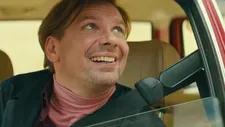 |
| Michael Maertens as Claude: "asked what he thought about Margit Carstensen, he screamed with happiness" |
AKT: Potsdamer Platz.
FF: It's true. Why else would you make things extra-ugly?
CK: Potsdamer Platz looks like a mall anywhere. In Bielefeld. They had Rem Koolhaas designs and they said no to it.
FF: We've just been to Tokyo with the film and they took away a lot of the old architecture and built new things but somehow they managed to make it beautiful. A beautiful modern city. Or here in New York you see a mix of old and new and somehow it works. It's hard to explain that to Germans when they're so used to the ugliness. Even the product design. In England, for example, even in the cheapest supermarket, even if the food is not very good, they wrap it nicely. In Germany, they can't do that for some reason.
CK: In the deleted scenes there was one in a Biomarkt, an organic supermarket where Georg (Bernhard Schütz) and Inga (Corinna Harfouch) go and walk through these aisles of badly designed cornflakes packets and deconstruct the design. Because German organic products are not designed to look good.
AKT: They are not healthy if they look good.
CK: That's true. I haven't determined in my mind why that is but I think it's because German National Socialism comes out of an esoteric tradition. So, side-stepping twelve years of that, and then offering new esoteric "Körnerzeug" [Whole-grain-thingies] has to not in any way look like Albert Speer designed it.
AKT: That's the same logic as saying the worst thing about Hitler was his vegetarianism.
FF: I think a big part of that is Germans liking to punish themselves and to torture themselves. I'm part of the problem. I wouldn't have done a film like that if I wasn't.
AKT: Do you think there is an individual decision making process like that in Germany? Do people say, for example,"I'm going to buy myself the ugliest shirt I can find," to punish themselves?
FF: They don't allow themselves. My parents' generation, for example, it's that they don't allow themselves to have beautiful things. Even clothes. It has to be comfortable. It has to be functional.
CK: Practical. We never spoke about this in such detail but the catastrophe of mechanised destruction, industrialised destruction of Jews and Gypsies and homosexuals - the whole thing is so terrible and unbelievable and incomprehensible that you have to somehow, even we in our generation have to somehow create some sort of fur, otherwise it's just not possible. Why would a people do that to another people? That's actually a sentence in the film. It's like an absolute Armageddon in the twentieth century.
FF: This is why we're not allowed to have the good life. Although we do actually. In Germany, people are health insured, they get the best treatment, everyone does. A lot of things are good about it. You're just not allowed to…
AKT: …enjoy it! Which brings us full circle back to evil.
FF: That's interesting. Have you ever read Klaus Theweleit's Male Fantasies?
AKT: Of course.
FF: He actually talks a lot about enjoyment and men how they enjoyed their horses and then enjoyed doing evil. There is this whole issue that you never really talk about in school in Germany. It's always the bad guys that did something. There's always enjoyment. You see it in genocide in general.
AKT: It is the most terrifying thing - the enjoyment of evil. We like to make it neutral to neuter it.
FF: In general, we are afraid to talk about it. We'd have to ask ourselves. Would we be capable of doing something?
AKT: That's what you show in Natalie (Carla Juri).
CK: When you say - are we capable? Our relatives were capable of doing it. This is not some African dictatorship. It's grandpa in the Ukraine. It's very rich tapestry. Wait till you see her next film.
AKT: I know you are working on the script together. Anything more you can tell me? A secret?
FF: Nothing to do with Germany.
CK: The human condition will be continued to be examined.
In part 1, we discussed why Finsterworld could only have been written from outside, childhood obsessions allowed to artists, fairy tale houses made of food and Wes Anderson's stylised truth.
Finsterworld's final screening at the Edinburgh International Film Festival will be on Friday, June 27.





















